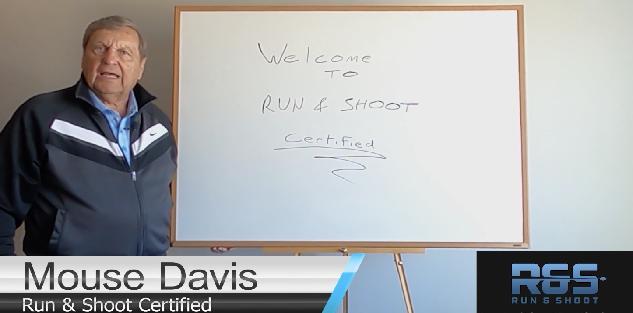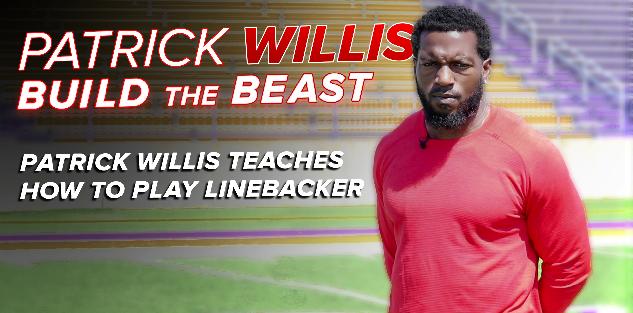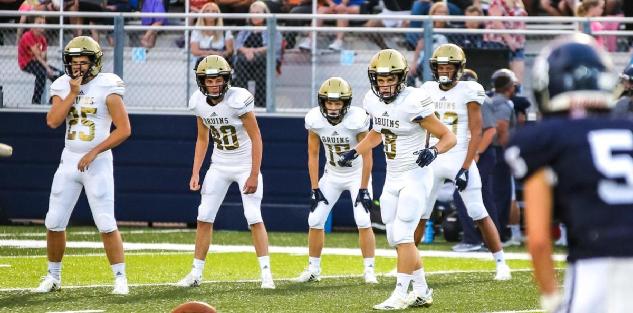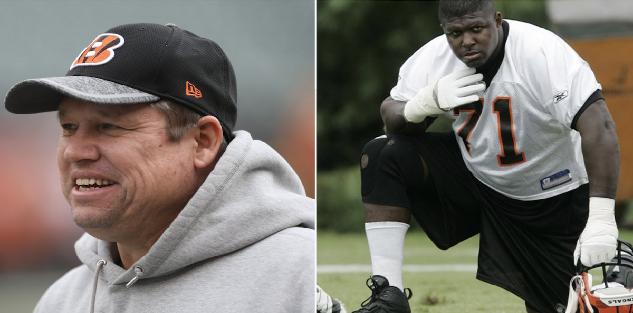Featured courses
- Jim Thorpe Award Winner Jahdae Barron’s 4 Drills for Dominating Receivers by Grant Young
- 5 Tips to Improve Your Football Game Plan by Andrew Dohre
- Game Changer RPO Football : Wing-T Offense by Andrew Dohre
- Mastering the Pass Rush: Expert Drills and Progression Tips from UCLA’s Coach Ikaika Malloe by Andrew Dohre
- 3 SPO’s to Protect the Passing Game and create opportunities in space by Keith Grabowski
- The Art of Running the Corner Route- Coaches and Players Prespectives by CoachTube Staff
- Evolve your Defense with Quarter, Quarter Half to Stop RPO by Coach Grabowski
- Top 10 College Football Players to Watch for in 2022 by Alec Burris
- Clemson vs. Syracuse Matchup of the Week by Keith Grabowski
- Sprint Out Passing: Move the Pocket for Success by Keith Grabowski
- Unlocking the True Potential of Your Special Teams Play by Keith Grabowski
- The Most Important Components of Air Raid by Keith Grabowski
- 4 Plays that Benefit from Bunch Formations by Keith Grabowski
- 3 Third Level RPOs for Explosive Plays by Keith Grabowski
- The Role of the Screen Game in Explosive Offense by Keith Grabowski
- The Chess Match: Win on the Perimeter (Part 1) by Coach Grabowski
- Unlocking the Power of Gap Manipulation to Limit Explosive Plays by Keith Grabowski
- TCU’s 3-3-5 and facing bigger personnel by Keith Grabowski
- Elevating Your Team: Strategies from Coach Matt Ruhle by Keith Grabowski
- 7 RPO’s for your playbook by Coach Keith
- Beyond Quarters - The Need For Additional Coverage Concepts by Keith Grabowski
- 5 Core Offensive Priniciples for a Winning Football Formula by Keith Grabowski
- Win Downfield - Attacking Different Areas Deep with 3rd Level RPO by Coach Grabowski
- WAKE FOREST’S UNIQUE RPO GAME by Keith Grabowski
- Adjustments to Defeat the Tite Front by Keith Grabowski
- Attack Defenses with The Versatile Y-Cross Concept by Keith Grabowski
- Play Action is a Cheat Code! - 5 Play Action Concepts to Increase Your Expected Points by Keith Grabowski
- Question from Rutgers OC - What does your offense say about your coaching? by Keith Grabowski
- Gap Schemes vs. Tight Fronts, Play Action Shots and Misdirection by Coach Grabowski
- Setting up your young Qb for success by Keith Grabowski
- The Hot Gap plus 3 Gap Scheme RPO’s to Stress the Defense by Keith Grabowski
- How Football Coaches Can Build A Game-Changing Special Teams Unit by Grant Young
- Master the Art of Quick Passing for High Completion Percentages by Keith Grabowski
- How to Be an Influential Football Coach by Grant Young
- How to Maximize Tackling Efficiency within Scheme by Keith Grabowski
- Offensive Drills of the Week by Keith Grabowski
- How a Stoplight Can Make Your Fly Sweep Takeoff by Keith Grabowski
- Keep your Drills Fresh and Your Skills Developing - Offense by Keith Grabowski
- Coach Kevin Kelley, Outside The Box by Keith Grabowski
- Want your defense to get off the field after third down? Sims and Creepers are the answer! by Keith Grabowski
- Create More Turnovers with Circuit Training & Win More Games! by Keith Grabowski
- Devastate the Defense with TE RPOs by Keith Grabowski
- Red Zone adjustments by Keith Grabowski
- CoachesClinic.com Featured Matchup: Cincinnati vs Indiana by Caleb Hopkins
- 3 NFL ZONE RUN PLAYS FROM WEEK 7 by Alex Kirby
- Sonny Dykes Teaches You How to Put Together an Offense by Coach Grabowski
- FIVE REASONS TO RUN THE 3-3 DEFENSE by Alex Kirby
- Getting Your Defense Ahead - 1st and 2nd down Pressures from Noah Joseph by John Grayson
- Chad Morris Teaches How To Builds an Offense by Coach Grabowski
- Get Your Offense a +1 With the QB Run Game by Coach Grabowski
- Are You Causing a 14 Point Turnaround...Against Your Team? by Coach Grabowski
- Learn How to Improve Your Offense with USC’s “Harrell Effect” by Coach Grabowski
- The Power of Influence - Rick Jones, Mizzou by Coach Grabowski
- Easy QB Runs to Drive Defenses Crazy by Ryan Eisenberger
- How many different ways can you make the defense cover everyone? by Ryan Eigenberger
- Win Passing Downs with Creepers and Sims by Coach Grabowski
- Always have a plan to play your best 11 by Keith Grabowski
- Dominate the Defense with Double Teams by Coach Grabowski
- Buffalo OC teaches his model for game planning by Keith Grabowski
- Put your 3 Deep Coverage in a Better Position with Zone Alert Rotations by Coach Grabowski
- 5 Keys to Using Trick Plays by Coach Grabowski
- Learn from 'Juggernaut' Offense by Keith Grabowski
- Bob Wylie - Offensive Line Breakdowns by Coach Grabowski
- Utilizing the Hybrid Linebacker to take away Offensive Advantages by Coach Grabowski
- Always have a plan to play your best 11 by Keith Grabowski
- Coachesclinic.com Featured Matchup: #6 Oklahoma vs #21 Texas by Caleb Hopkins
- Easy for You - Difficult for Them Adjustments by Keith Grabowski
- Coachesclinic.com Featured Matchup: Davidson College vs Presbyterian by Caleb Hopkins
- Week 5 National High School Football Rankings by Keith Grabowski
- Protecting Aaron Rodgers (and your own QB) by Caleb Hopkins
- Defensive Drills of the Week by Keith Grabowski
- Woo Pig - Add a wrinkle with these Arkansas Downhill Run Variations by Keith Grabowski
- Coachesclinic.com Featured Matchup: #7 Cincinnati vs #9 Notre Dame by Caleb Hopkins
- Offensive Drills of the Week by Keith Grabowski
- Coach Jason McEndoo Teaches #12 Oklahoma State’s Top Running Play by Keith Grabowski
- Adjustments - Attach Screens to your best plays, defend star receivers, & movement to stop the run by Keith Grabowski
- Coachesclinic.com Featured Matchup: Army vs #16 Wake Forest by Caleb Hopkins
- How To Implement A Running-Back-By-Committee Scheme by Brandon Ogle
- How To Become The Most Feared Offensive Lineman In Your League by Chrisian Benavides
- Wylie, McNally and Alexander Key Coaching Points on the Wide Zone Play by Keith Grabowski
- #21 Coastal Carolina’s play that is a whole offense within itself by Keith Grabowski
- 4 Plays that Benefit from Bunch Formations by Keith Grabowski
- Best Mesh Concept Plays by Ron McKie
- Forming Families For Football by Darryl Page
- Top 5 Things Coaches Should Strive To Get Out Of Spring Camp by Darryl Page
- 10 Tips To Know Before Attending Football Camps by James Breland
- Offensive Line Drills by Rick Bouch
- You’re a captain, now what? 5 Tips to bring your team together and establish yourself as a true leader by Lester Crafton
- COACHING THE 4-2-5 DEFENSE VS SPREAD TEAMS by Alex Kirby
- Gifts From Grinch by Coach Grabowski
- A Package to Help You Win Mid to Late Season by Coach Grabowski
- The Future of American Football: How to Run the Spread Offense by Coach Scott
- Chris Ash teaches Longhorn Tackling by Coach Grabowski
- The misunderstood Yet Powerful Run Scheme - Duo by Coach Keith
- THE GUS MALZAHN QUARTERBACK COUNTER PLAY by Alex Kirby
- FIVE TIPS FROM GUS MALZAHN ON HOW TO BUILD YOUR PLAYBOOK by Alex Kirby
- LITTLEST KID ON THE FIELD TRUCKS LINEMAN – YOU CAN’T MAKE THIS STUFF UP by Jacob
- HOW TO MAXIMIZE YOUR OFFSEASON FOOTBALL TRAINING by Dominic
- BAD CALL, GREAT COACH: THIS IS WHY PLAYERS LOVE PETE CARROLL by Jacob
- How to Get Recruited for Collegiate Sports by Brandon Ogle

HOW TO MAXIMIZE YOUR OFFSEASON FOOTBALL TRAINING
- By Dominic
Off-Season Mode
It’s winter time and it’s the perfect time to build your game skills. It’s not the time slack off and relax, however tempting it may be. You know that you’re still a football player who has a bright future ahead of you that can easily be crushed by your lack of commitment. You STILL need to keep fit and in-shape for the game every time.
If you choose to spend your off-season by just splashing at the pool all the day long as you eat burgers and play Madden, you’ll certainly regret everything you did when the new season starts. It’ll take some time to be able to regain your form following months of slacking off. Sure. Your experience will be a pain the a**.
What’s the Solution?
There is absolutely no room for complacency on your part as a football player during the off-season. You really need to commit yourself to an offseason football training to make you remain relevant and competitive in the game. This training program will enable you to improve on your game by sharpening your skills come the new season.
A productive off-season football training is the most important thing for you as an athlete.
Let’s get started.
Here are some useful tips for a successful training:
Start with a Plan
Plan your off-season training well for it to be fruitful. A good plan maximizes your football skills and strengths. It’s possible to do some exercises while still having a good time during your off-season training. These can include playing pick-up basketball or hiking with your friends. You should remember that you’re still a football player and you should remain focused on your training.
Set Goals
Apart from just staying fit, you should also set goals on what you plan to achieve at the end of the off-season. Here are two things to do before embarking on your off-season training:
Get the Evaluation from your Coaches (Head Coach, Position Coach)
Coaches are supposed to evaluate the performance of the players they coach. Your position coach is likely to tell you exactly the areas you need to improve on at the end of a season and before the new season starts. Your coach can also share with you training and exercise activities you can employ in your training.
Evaluate Your Own Performance
The fact that you know yourself better than anybody else makes your self-evaluation very important. You know the areas you’re not good enough and you know very well that you can work on to improve on them. Again, the off-season gives you an opportunity to improve as an individual player as you’re able to train alone and focus on improving your skills as a football player. The training sessions you have when the season starts are meant to improve the team as a whole.
Setting Specific Goals
You should keep specific goals which will make a good football player. Specific goals makes it easier for you to evaluate your off-season training performance as well as to pick the right training exercises. An example of a specific goal is aiming to increase the maximum weight of your bench press by like 20 pounds instead of just aiming to get stronger. Another specific goal could be aiming to decrease your 40-yard dash by a second.
You should keep specific goals which will make a good football player. Specific goals makes it easier for you to evaluate your off-season training performance as well as to pick the right training exercises. An example of a specific goal is aiming to increase the maximum weight of your bench press by like 20 pounds instead of just aiming to get stronger. Another specific goal could be aiming to decrease your 40-yard dash by a second.
Without these specific goals, it will not impossible to know whether you have managed to improve on your strength and speed. Your offseason football training may not be fruitful at all and you will not have improved as an individual player.
Create a Routine
Create a training routine once you are very sure of what you want to achieve at the end of the off-season training. A regular routine makes you keep on improving on your performances to enable you to ultimately achieve your goal.
A routine doesn’t imply that you’ll be doing exactly the same exercises all the day. A good routine should incorporate a variety of exercises to prevent your training from becoming boring while at the same time corresponding to your set of goals. This creates a well-rounded training that targets your muscles in different ways.
There are many different exercises that you can choose from. While most of them are good for you as a football player, others are not that helpful. You should only focus on your specific set goals that guides you in choosing the perfect exercises as well as designing your routine for your off-season training.
It is important for you to have a wide variety of exercises for your training despite having set specific goals. For instance, it’s not practical to have a training session that entirely has weightlifting or running exercises. Try to mix it up. You should also include strength, agility and endurance exercises to balance your training plan and avoid making the session monotonous.
An example of such a good routine may include having like three sets of 10-15 reps of dumbbell bicep curls, four sets of 6-10 reps of standing military press, 15 minutes of rope jumping, five sets of 10 reps of maximum speed burpees , 100 sit-ups and many more. This will be an example of a well-rounded training session.
Hard Work Pays
Yes. It does. And you know it’s true. The effort you put in your offseason football training will determine your form and sharpness come the start of the new season. Your own initiative and motivation during training entirely comes from you as there’s no coach directing you on what to do. These sessions are not compulsory like the ones you have during the season and there are not fines for not showing up either. The discipline you show during this offseason will make you a better football player and a better athlete.
Be sure to Sign-Up for our Free Football Training Courses Today!s Today!










